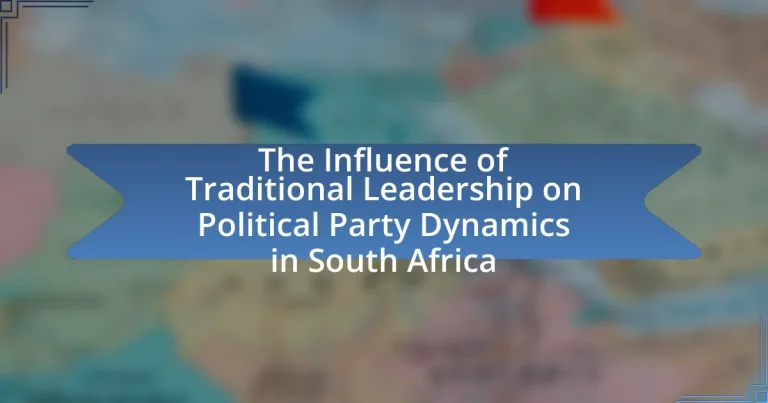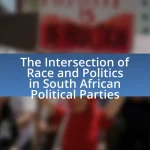The article examines the influence of traditional leadership on political party dynamics in South Africa, highlighting the significant role traditional leaders play in shaping local governance and community loyalty. It discusses how traditional leaders, particularly in rural areas, can mobilize voters and impact party strategies, especially for the African National Congress (ANC). The article also explores the historical context of traditional leadership, its interaction with political parties, and the implications for governance and accountability, while noting regional variations in influence and potential future trends in the relationship between traditional authority and modern political structures.
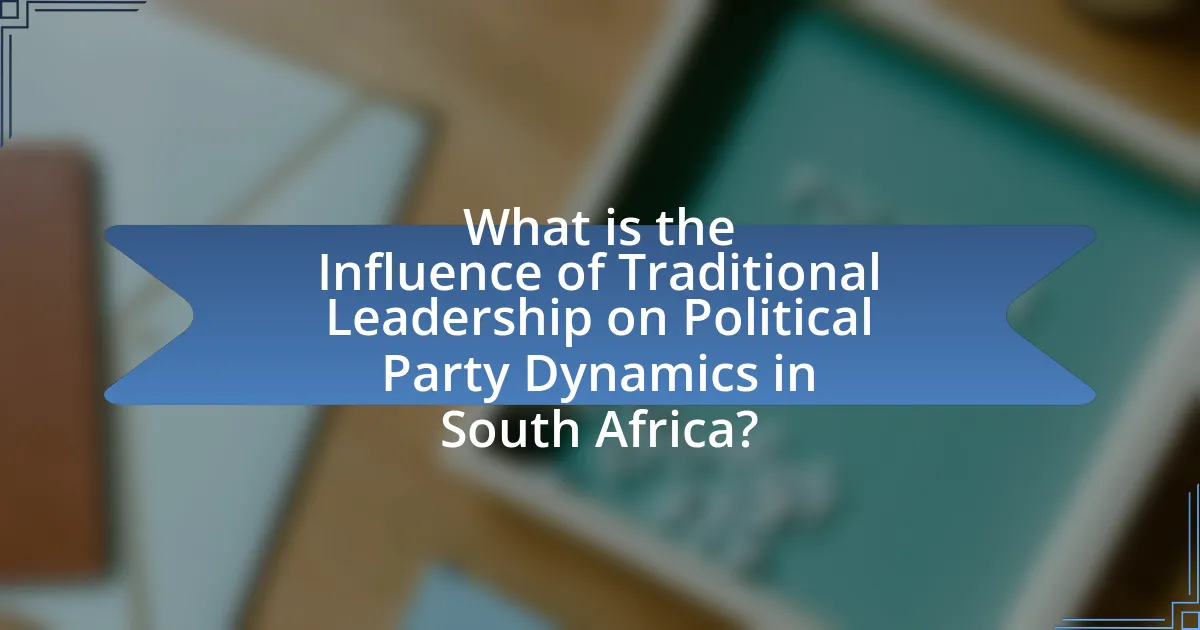
What is the Influence of Traditional Leadership on Political Party Dynamics in South Africa?
Traditional leadership significantly influences political party dynamics in South Africa by shaping local governance structures and community loyalty. Traditional leaders often hold considerable sway over their communities, which can translate into political support for specific parties, particularly the African National Congress (ANC), which has historically aligned itself with traditional authority. This alignment is evident in the ANC’s reliance on traditional leaders to mobilize voters during elections, as seen in the 2019 national elections where traditional leaders played a crucial role in voter turnout in rural areas. Furthermore, traditional leadership can create tensions within political parties, as competing factions may seek to gain the favor of these leaders to enhance their political capital, thereby affecting party cohesion and strategy.
How does traditional leadership manifest in South African politics?
Traditional leadership in South African politics manifests through the recognition and integration of traditional leaders within the formal political framework, influencing governance and community decision-making. Traditional leaders, such as chiefs and headmen, hold significant cultural authority and often serve as intermediaries between the government and rural communities, impacting local governance structures. The South African Constitution acknowledges the role of traditional leadership, allowing for the establishment of traditional councils that advise local governments. This integration is evident in the Traditional Leadership and Governance Framework Act of 2003, which formalizes the role of traditional leaders in governance, thereby reinforcing their influence in political dynamics and community representation.
What are the key characteristics of traditional leadership in South Africa?
Traditional leadership in South Africa is characterized by a strong connection to cultural heritage, authority derived from lineage, and a role in community governance. Traditional leaders, often referred to as chiefs or headmen, hold significant influence within their communities, serving as custodians of customs and traditions. Their authority is typically inherited, reflecting a system where leadership is passed down through family lines, which reinforces social cohesion and cultural identity. Additionally, traditional leaders often mediate disputes and provide guidance on local governance issues, thereby playing a crucial role in the socio-political landscape. This influence is recognized in South African law, particularly in the Traditional Leadership and Governance Framework Act of 2003, which acknowledges the role of traditional leaders in local governance structures.
How do traditional leaders interact with political parties?
Traditional leaders interact with political parties primarily through collaboration and negotiation, influencing local governance and political dynamics. In South Africa, traditional leaders often serve as intermediaries between their communities and political parties, facilitating communication and representing the interests of their constituents. This interaction can manifest in various forms, such as participating in political discussions, endorsing candidates, or mobilizing community support for specific policies or initiatives. For instance, the role of traditional leaders was highlighted during the 2019 elections, where they played a significant part in voter mobilization efforts, demonstrating their influence on political party strategies and community engagement.
Why is understanding this influence important for political dynamics?
Understanding the influence of traditional leadership on political dynamics is crucial because it shapes voter behavior and party allegiance in South Africa. Traditional leaders hold significant cultural authority and can mobilize communities, impacting electoral outcomes and party strategies. For instance, during the 2019 elections, the African National Congress (ANC) relied on traditional leaders to secure votes in rural areas, demonstrating their pivotal role in influencing political landscapes. This influence is further evidenced by the fact that traditional leaders often serve as intermediaries between the government and local communities, thereby affecting policy implementation and governance.
What historical context shapes the relationship between traditional leadership and political parties?
The historical context that shapes the relationship between traditional leadership and political parties in South Africa is rooted in the colonial and apartheid eras, which established a complex interplay between indigenous authority and state power. During colonial rule, traditional leaders were often co-opted by colonial administrations to maintain control over local populations, leading to a dual system of governance where traditional authority existed alongside imposed political structures. This dynamic intensified under apartheid, as the government sought to manipulate traditional leadership to legitimize its policies and suppress resistance, exemplified by the Bantustan system that aimed to fragment African political identity.
Post-apartheid, the African National Congress (ANC) has engaged with traditional leaders to consolidate its power, recognizing their influence in rural areas and their role in community governance. This relationship is further complicated by the South African Constitution, which acknowledges traditional leadership while also promoting democratic governance, creating tensions between traditional authority and modern political structures. The historical manipulation of traditional leaders by colonial and apartheid regimes has led to ongoing debates about their role in contemporary politics, influencing party dynamics and electoral strategies.
How does this influence affect voter behavior and party loyalty?
The influence of traditional leadership significantly affects voter behavior and party loyalty in South Africa by reinforcing allegiance to political parties that align with the values and authority of traditional leaders. Traditional leaders often serve as key intermediaries between the government and local communities, shaping public opinion and mobilizing support for specific parties. For instance, research indicates that communities with strong traditional leadership tend to exhibit higher loyalty to political parties endorsed by these leaders, as seen in the 2019 national elections where areas with active traditional leaders showed increased voter turnout for the African National Congress, which has historically maintained ties with traditional structures. This dynamic illustrates how traditional authority can sway voter preferences and solidify party loyalty, ultimately influencing electoral outcomes.
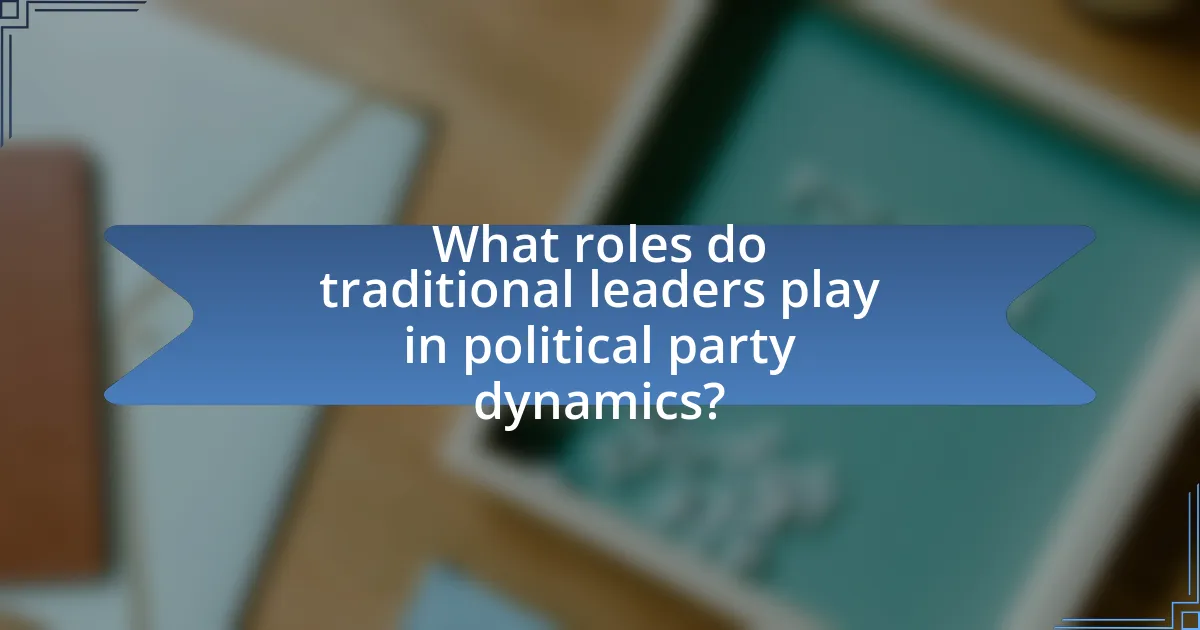
What roles do traditional leaders play in political party dynamics?
Traditional leaders play a significant role in political party dynamics by acting as intermediaries between the government and local communities, influencing voter behavior and party loyalty. Their authority and cultural significance often grant them the ability to mobilize support for political parties, particularly in rural areas where traditional structures hold sway. For instance, during elections, traditional leaders can endorse candidates, which can substantially sway the electorate’s decisions, as seen in the 2019 South African elections where endorsements from traditional leaders were pivotal in securing votes for certain parties. Additionally, traditional leaders often participate in political negotiations and discussions, providing a channel for community concerns to be addressed within the political framework, thereby shaping party policies and strategies.
How do traditional leaders influence party policies and decisions?
Traditional leaders influence party policies and decisions by serving as key intermediaries between the government and local communities, thereby shaping political agendas. Their authority and cultural significance enable them to mobilize support for political parties, particularly in rural areas where they hold considerable sway. For instance, traditional leaders often endorse specific candidates or policies, which can significantly impact voter behavior and party alignment. This influence is evident in South Africa, where traditional leaders have historically played a role in the African National Congress’s (ANC) strategies, particularly during elections, by leveraging their community ties to enhance voter turnout and support for party initiatives.
What mechanisms do traditional leaders use to exert influence?
Traditional leaders exert influence through mechanisms such as cultural authority, social networks, and political alliances. Cultural authority stems from their roles as custodians of tradition and customs, which grants them respect and legitimacy within their communities. Social networks enable traditional leaders to mobilize community members and facilitate communication, thereby shaping public opinion and political behavior. Political alliances with formal political parties allow traditional leaders to negotiate power dynamics, often resulting in mutual support during elections. For instance, in South Africa, traditional leaders have historically played a significant role in local governance and have been instrumental in voter mobilization, impacting electoral outcomes and party dynamics.
How do political parties leverage traditional leadership for electoral success?
Political parties leverage traditional leadership for electoral success by aligning their platforms with the values and influence of traditional leaders, thereby gaining legitimacy and support within communities. Traditional leaders often hold significant sway over local populations, and political parties recognize this by engaging these leaders in their campaigns, which can enhance voter turnout and loyalty. For instance, during the 2019 South African elections, the African National Congress (ANC) actively sought endorsements from traditional leaders to strengthen its appeal in rural areas, where these leaders are pivotal in shaping public opinion and mobilizing voters. This strategy not only helps parties to tap into established networks of trust but also reinforces their cultural relevance, ultimately contributing to their electoral success.
What challenges arise from the influence of traditional leadership?
The challenges arising from the influence of traditional leadership include the potential for conflict between modern democratic practices and customary authority. Traditional leaders often hold significant sway over their communities, which can undermine the legitimacy of elected officials and political parties. This dynamic can lead to a lack of cohesion within political structures, as traditional leaders may prioritize local customs over national policies, creating fragmentation in governance. Additionally, the reliance on traditional leadership can perpetuate inequalities and hinder progressive reforms, as these leaders may resist changes that threaten their established power. For instance, in South Africa, the dual authority of traditional leaders and elected officials has been documented to create tensions that complicate governance and policy implementation, as seen in various studies on local governance dynamics.
How does the dual authority of traditional leaders and elected officials create conflicts?
The dual authority of traditional leaders and elected officials creates conflicts by leading to overlapping jurisdictions and competing loyalties among the populace. Traditional leaders often hold significant cultural influence and authority within their communities, which can undermine the legitimacy of elected officials who are expected to govern based on democratic principles. For instance, in South Africa, traditional leaders may prioritize local customs and practices over national policies, causing friction with elected representatives who are bound by law to implement those policies. This tension can result in divided allegiances among community members, as they may feel torn between the directives of their traditional leaders and the mandates of their elected officials, ultimately complicating governance and community cohesion.
What are the implications for governance and accountability?
The implications for governance and accountability in the context of traditional leadership’s influence on political party dynamics in South Africa include potential challenges to democratic processes and the reinforcement of patronage systems. Traditional leaders often hold significant sway over their communities, which can lead to conflicts between customary authority and elected political structures. This dynamic may undermine accountability, as traditional leaders may prioritize loyalty to their communities over adherence to democratic principles. For instance, the South African Constitution recognizes traditional leadership, but this duality can create ambiguity in governance, leading to issues such as lack of transparency and reduced public trust in political institutions.
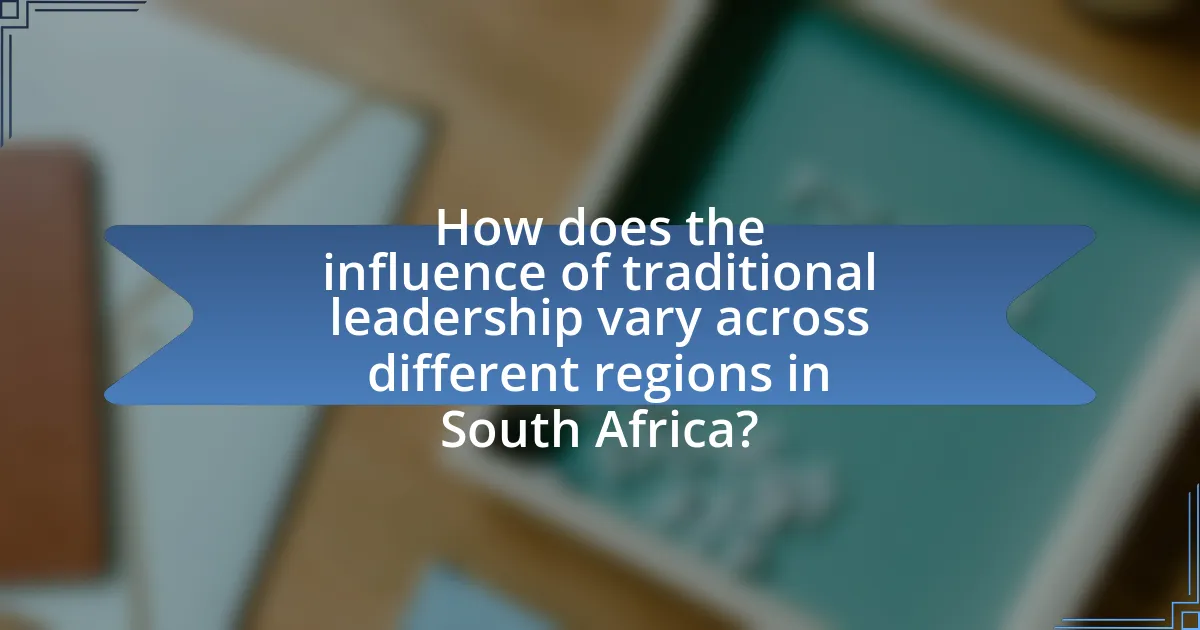
How does the influence of traditional leadership vary across different regions in South Africa?
The influence of traditional leadership in South Africa varies significantly across regions, with notable differences in authority, recognition, and integration into formal governance structures. In rural areas, particularly in the Eastern Cape and KwaZulu-Natal, traditional leaders often hold substantial sway over local communities, serving as mediators and decision-makers, which is supported by the Traditional Leadership and Governance Framework Act of 2003 that recognizes their roles. Conversely, in urban areas like Gauteng, traditional leadership has diminished influence due to the prevalence of modern political structures and party politics, leading to a more fragmented relationship between traditional leaders and local governance. This regional disparity highlights how traditional leadership can either reinforce or challenge political party dynamics, depending on the local context and historical factors.
What regional differences exist in the relationship between traditional leadership and political parties?
In South Africa, regional differences in the relationship between traditional leadership and political parties are evident, particularly between rural and urban areas. In rural regions, traditional leaders often hold significant influence over local communities, which can lead to a symbiotic relationship with political parties that seek their support for electoral gains. For instance, in the Eastern Cape and KwaZulu-Natal, traditional leaders play a crucial role in mobilizing voters and maintaining social cohesion, often aligning with the African National Congress (ANC) to reinforce their authority.
Conversely, in urban areas like Gauteng, traditional leadership is less influential, as political parties tend to focus on broader issues such as economic development and service delivery, which resonate more with a diverse electorate. In these regions, political parties may prioritize modern governance structures over traditional authority, leading to a more competitive political landscape where traditional leaders have diminished power.
This divergence illustrates how the historical context and socio-economic factors shape the dynamics between traditional leadership and political parties across different regions in South Africa.
How do cultural factors shape these regional dynamics?
Cultural factors significantly shape regional dynamics in South Africa by influencing political affiliations and community engagement. Traditional leadership, deeply rooted in cultural practices, often dictates the political landscape, as leaders wield considerable influence over their communities. For instance, in regions where tribal affiliations are strong, political parties may align their platforms with local customs and values to gain support, as seen with the African National Congress (ANC) leveraging traditional structures to maintain authority. This alignment is evident in the Eastern Cape, where the ANC’s success is partly attributed to its recognition of Xhosa cultural practices. Additionally, cultural events and rituals serve as platforms for political mobilization, reinforcing the connection between cultural identity and political loyalty.
What examples illustrate these regional variations?
Examples illustrating regional variations in the influence of traditional leadership on political party dynamics in South Africa include the contrasting roles of traditional leaders in KwaZulu-Natal and the Eastern Cape. In KwaZulu-Natal, traditional leaders often align closely with the African National Congress (ANC), leveraging their authority to mobilize support for the party, as seen in the 2019 elections where the ANC maintained significant control partly due to traditional leadership backing. Conversely, in the Eastern Cape, traditional leaders have shown a more fragmented influence, with some supporting the ANC while others have aligned with the Economic Freedom Fighters (EFF), reflecting a diverse political landscape that impacts party dynamics differently across regions. This variation highlights how local cultural and historical contexts shape the political engagement of traditional leaders in South Africa.
What future trends can be anticipated regarding traditional leadership and political party dynamics?
Future trends indicate that traditional leadership in South Africa will increasingly influence political party dynamics through a resurgence of local governance and cultural identity. As political parties seek to strengthen their grassroots support, they are likely to engage more with traditional leaders, recognizing their role in community cohesion and decision-making. This trend is supported by the growing recognition of traditional leadership’s legitimacy, as evidenced by the South African Constitution, which acknowledges the role of traditional leaders in governance. Additionally, the integration of traditional leaders into political frameworks may lead to a hybrid model of governance, blending modern political practices with traditional authority, thereby reshaping party strategies and electoral outcomes.
How might changing societal values impact traditional leadership’s role in politics?
Changing societal values can significantly diminish the role of traditional leadership in politics by shifting public expectations towards more democratic and inclusive governance. As South African society increasingly values equality, transparency, and accountability, traditional leaders may find their authority challenged, particularly when their practices do not align with these emerging norms. For instance, the rise of civil society movements advocating for social justice and political reform has led to a reevaluation of the relevance of traditional leadership structures, which often operate within hierarchical and patriarchal frameworks. This shift is evidenced by the growing support for political parties that prioritize democratic principles over traditional authority, indicating a potential decline in the influence of traditional leaders in political decision-making processes.
What potential reforms could alter the influence of traditional leaders on political parties?
Potential reforms that could alter the influence of traditional leaders on political parties include the establishment of legal frameworks that limit the political roles of traditional leaders, the promotion of democratic governance structures within communities, and the implementation of electoral reforms that enhance party accountability. Legal frameworks, such as the Traditional Leadership and Governance Framework Act, can delineate the powers of traditional leaders, thereby reducing their sway over political party decisions. Promoting democratic governance structures encourages community participation in decision-making, which can diminish the reliance on traditional authority. Additionally, electoral reforms that prioritize transparency and accountability in party funding and candidate selection can weaken the traditional leaders’ influence by fostering a more meritocratic political environment.
What best practices can political parties adopt to navigate the influence of traditional leadership?
Political parties can adopt inclusive engagement strategies to navigate the influence of traditional leadership effectively. By actively involving traditional leaders in policy discussions and decision-making processes, parties can foster collaboration and mutual respect. This approach is supported by the recognition that traditional leaders hold significant sway over their communities, as evidenced by their role in local governance and cultural practices. Furthermore, parties should prioritize building strong relationships with these leaders, as studies indicate that such alliances can enhance electoral support and community trust. Engaging in regular dialogue and addressing the concerns of traditional leaders can lead to more cohesive political strategies that resonate with the electorate.
How can political parties engage effectively with traditional leaders?
Political parties can engage effectively with traditional leaders by establishing respectful and collaborative relationships that recognize the leaders’ influence within their communities. This engagement can include regular consultations, joint community initiatives, and participation in cultural events, which help build trust and mutual understanding. For instance, political parties that involve traditional leaders in policy discussions can leverage their local knowledge and authority, enhancing the parties’ credibility and outreach. Research indicates that traditional leaders play a significant role in local governance and community mobilization, making their involvement crucial for political parties aiming to gain support in rural areas.
What strategies can enhance collaboration between traditional leadership and political entities?
Enhancing collaboration between traditional leadership and political entities can be achieved through mutual respect, inclusive dialogue, and shared goals. Establishing platforms for regular communication allows traditional leaders to voice community concerns while political entities can align their policies with local needs. For instance, the recognition of traditional leaders in legislative processes can foster trust and cooperation, as seen in South Africa’s recognition of traditional leadership in the Constitution, which emphasizes their role in governance. Additionally, joint community development initiatives can create a sense of partnership, ensuring that both parties work towards common objectives that benefit the community.
